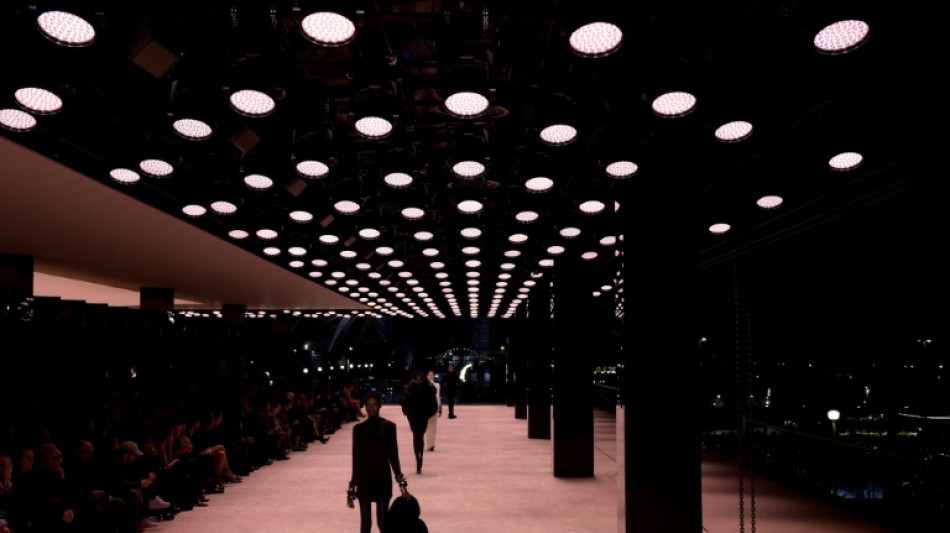
-
 Scandic Trust Group strengthens sales network with First Idea Consultant
Scandic Trust Group strengthens sales network with First Idea Consultant
-
Turmoil in tiaras at Miss Universe pageant in Thailand

-
 Probe into Thales defence group looking at Indonesian contract
Probe into Thales defence group looking at Indonesian contract
-
US to cancel flights as longest govt shutdown drags on

-
 Home in Nigeria, ex-refugees find themselves in a war zone
Home in Nigeria, ex-refugees find themselves in a war zone
-
Doncic's Lakers hold off Wembanyama's Spurs, Blazers silence Thunder

-
 For Turkey's LGBTQ community, draft law sparks existential alarm
For Turkey's LGBTQ community, draft law sparks existential alarm
-
Musk's $1 trillion pay package to face Tesla shareholder vote

-
 Tonga rugby league star out of intensive care after seizure
Tonga rugby league star out of intensive care after seizure
-
Argentine ex-president Kirchner goes on trial in new corruption case

-
 Dams, housing, pensions: Franco disinformation flourishes online
Dams, housing, pensions: Franco disinformation flourishes online
-
Endo returns as Japan look to build on Brazil win

-
 Franco captivates young Spaniards 50 years after death
Franco captivates young Spaniards 50 years after death
-
German steel industry girds for uncertain future

-
 IPL champions Bengaluru could be sold for 'as much as $2 billion'
IPL champions Bengaluru could be sold for 'as much as $2 billion'
-
Budget impasse threatens Belgium's ruling coalition

-
 New Zealand ex-top cop admits to having material showing child abuse, bestiality
New Zealand ex-top cop admits to having material showing child abuse, bestiality
-
BoE set for finely balanced pre-budget rate call

-
 Australian kingpin obtains shorter sentence over drug charge
Australian kingpin obtains shorter sentence over drug charge
-
Weatherald's unenviable Ashes task: fill giant hole at top left by Warner

-
 Ovechkin first to score 900 NHL goals as Capitals beat Blues
Ovechkin first to score 900 NHL goals as Capitals beat Blues
-
On Mexico City's streets, vendors fight to make it to World Cup

-
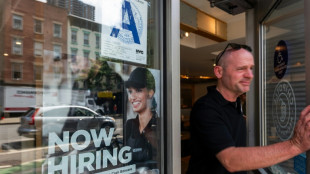 Asian markets bounce from selloff as US jobs beat forecasts
Asian markets bounce from selloff as US jobs beat forecasts
-
Philippine death toll tops 140 as typhoon heads towards Vietnam

-
 Kyrgios targets 'miracle' Australian Open return after knee improves
Kyrgios targets 'miracle' Australian Open return after knee improves
-
'AI president': Trump deepfakes glorify himself, trash rivals

-
 Belgium probes drone sightings after flights halted overnight
Belgium probes drone sightings after flights halted overnight
-
Five things to know about 'forest COP' host city Belem
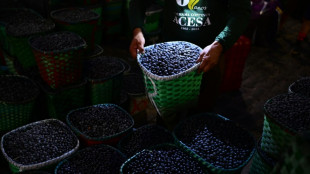
-
 World leaders to rally climate fight ahead of Amazon summit
World leaders to rally climate fight ahead of Amazon summit
-
Engine fell off US cargo plane before deadly crash: officials

-
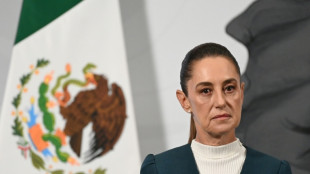 Mexican leader calls for tougher sexual harassment laws after attack
Mexican leader calls for tougher sexual harassment laws after attack
-
Meghan Markle set for big screen return: reports

-
 Japan deploys troops after wave of deadly bear attacks
Japan deploys troops after wave of deadly bear attacks
-
FIFA announce new peace prize to be awarded at World Cup draw in Washington

-
 Australia's Cummins hints at return for second Ashes Test
Australia's Cummins hints at return for second Ashes Test
-
Boeing settles with one plaintiff in 737 MAX crash trial

-
 Man City win as Inter stay perfect, Barca held in Champions League
Man City win as Inter stay perfect, Barca held in Champions League
-
French superstar DJ Snake wants new album to 'build bridges'

-
 Barca rescue draw at Club Brugge in six-goal thriller
Barca rescue draw at Club Brugge in six-goal thriller
-
Foden hits top form as Man City thrash Dortmund

-
 NBA officials brief Congress committee over gambling probe
NBA officials brief Congress committee over gambling probe
-
Inter beat Kairat Almaty to maintain Champions League perfection

-
 Newcastle sink Bilbao to extend Champions League winning run
Newcastle sink Bilbao to extend Champions League winning run
-
Wall Street stocks rebound after positive jobs data
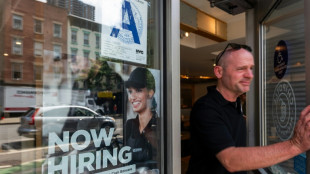
-
 LPGA, European tour partner with Saudis for new Vegas event
LPGA, European tour partner with Saudis for new Vegas event
-
Eyes turn to space to feed power-hungry data centers

-
 Jazz lose Kessler for season with shoulder injury
Jazz lose Kessler for season with shoulder injury
-
League scoring leader Messi among MLS Best XI squad

-
 MLS bans Suarez for Miami's winner-take-all playoff match
MLS bans Suarez for Miami's winner-take-all playoff match
-
McIlroy appreciates PGA of America apology for Ryder Cup abuse


The 'tyranny of thinness' still dominates fashion
Despite claims that the fashion industry is embracing curvier bodies, the data suggests it could be guilty of what one expert calls "fat-washing".
While a handful of plus-size models such as Paloma Elsesser have grabbed media attention in recent years, the figures shows they remain a vanishingly small minority.
Vogue Business looked at 9,137 outfits unveiled during 219 shows in New York, London, Milan and Paris last season and found that 0.6 percent were plus-size -- defined as US size 14 or above, which is actually the average size for a woman in the United States -- and only 3.8 percent were size 6-12.
This means 95.6 percent of outfits presented were in US size 0-4.
Paolo Volonte, who teaches sociology of fashion in Milan, says brands use a few curvy models to deflect criticism.
"It's 'fat-washing'," he told AFP, comparing it to criticisms of cynical "green-washing" by which the industry is accused of making empty climate pledges.
"They use curvy models in their shows to show inclusivity but in fact this is to preserve and maintain a system based on the tyranny of the thin ideal," Volonte said.
Ekaterina Ozhiganova, a 20-year-old model and law student, says luxury brands simply "refuse to represent normal people".
Medium-sized women "are often told either to lose weight... or to push themselves up to XL," she told AFP. "Neither is healthy."
- 'Darling, that's the job' -
Ozhiganova's advocacy group, Model Law, carried out a survey that found nine out of 10 models felt pressure to change their bodies, more than half on a regular basis.
"It's very hard for them to talk about," she said. "If you complain, everyone will just say: 'Darling, that's the job.'"
How it became "the job" is a question of history.
Volonte says the obsession with thinness dates back to the birth of industrial production techniques.
Previously, designers made clothes specific to individuals. In the mass production era, they use small templates which they scale up for larger sizes.
This only works up to a certain size, however, after which fat and muscle can change the shape of bodies in more complex ways.
"It is much more expensive to produce and sell clothing on higher sizes and requires more expertise," said Volonte.
At the same time, thinness became firmly associated with wealth -- having the time and money to work on your body -- an aspiration that has been deeply entrenched by advertising and the day-to-day practices of the fashion industry.
- 'A fantasy world' -
There have been efforts to change things since the early 2000s when fears spread that size-zero models were encouraging anorexia in young people.
Since 2017, France requires models to pass medical examinations, while the country's two biggest luxury conglomerates, LVMH and Kering, signed charters vowing to stop using size-zero models.
But with sizes varying from one brand to the next, this is hard to enforce.
Designers are as trapped in the status quo as everyone else.
Elite couturier Mohammad Ashi says discrimination based on race and gender has been fairly well tackled in fashion, but shape is tricky.
"We're not trying to avoid it, but from an industrial point of view, we can't produce a plus-size dress. We sell what we show and I know our clients personally. It's just business," he told AFP.
Couturier Julien Fournie has used pregnant models and his favourite model, Michaela Tomanova, has "six centimetres everywhere more than the others".
But he says, "fashion remains fashion... It's a fantasy world and that will never change fundamentally."
T.Zimmermann--VB




